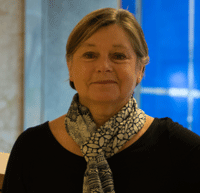“There is a huge gap between the academy and practice.” Professor Dame Jill Macleod Clark doesn’t mince words when addressing challenges facing the nursing profession, particularly in the UK. “Do we carry on doing more of the same, or do we start reframing the way we think about faculty and evidence based nursing care?” she asks. Dame Jill, former Dean of Health Sciences at Southampton University in the United Kingdom, visited Bloomberg Nursing at the invitation of Dean Linda Johnston to share her insights and the challenges the UK has faced on the eve of Bloomberg Nursing developing its next five year plan.
This practice gap is just one of the challenges facing the nursing profession. There are pockets of excellence, but Dame Jill asserts that the culture in nursing, as well as the other allied health professions, is largely not evidence-based. The United Kingdom has begun to combat this with the development of Clinical Academic Pathways for the non-medical allied health professions – nurses, physiotherapists, etc. “A physician has a career pathway – they know where they want to be, what the benchmarks are, and who the experts and resources are in their field or specialization,” Dame Jill says. “But if you speak to a nurse, who has expressed an interest in urology, say, and ask who the clinical research nursing experts are, they’ll give you a blank look.” She led a program at Southampton during her tenure as dean to begin to develop these clinical pathways, that will help nurses (and other professions) map their careers. “We’ve lost placing the focus of leadership in nursing on clinical practice,” she says. “We have nurses with huge amounts of clinical expertise, but they aren’t necessarily playing a key leadership role, either in terms of developing or applying an evidence base, or being a role model to a large number of people in practice.”
But why now? What is the impetus for having transformative discussions at this time? Dame Jill asserts a global problem that is widely acknowledged – nursing faculty are aging. “These discussions are part of a twenty year project,” she says. “It’s crucial that we start to ask the questions, and explore possible solutions and changes to how we frame nursing education now – we have an opportunity to transform the profession as this glut of aging faculty retire” she says.
Dame Jill had an extremely productive visit, sharing UK and Southampton models for clinical academic pathways and provoking debate with Bloomberg Nursing’s clinical partners in the Toronto Academic Health Sciences Network, as well as addressing deans from schools of nursing across Ontario. She has also had discussions with new faculty just embarking on their research and academic careers. “The way research funding is distributed is changing. We used to measure research output – quality and quantity of publications. The United Kingdom has recently shifted to measuring research impact, assessing how research has changed nursing practice, improved patient outcomes, informed national guidelines – and impact must be evidenced.” The United Kingdom uses a five-year peer assessment Research Evaluation Framework (REF) as a way of distributing research infrastructure resources between universities, a model which has yet to come to Canada, but is gaining traction around the world.
Whether through the development of clinical academic pathways, or the application of a standardized evaluation framework for research, one thing is certain – the nursing profession is poised at the cusp of change. “The bottom line challenges facing the nursing profession are the same whether in UK or in Canada,” Dame Jill states. “As a discipline, we are accepting the need to reframe the way we combine education, research and practice.”
